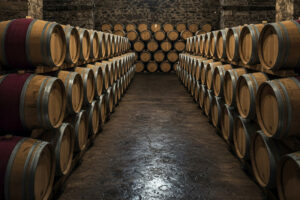Organic wine is, without a doubt, one of the fastest growing phenomena in recent years. And Italy is no exception, with 7% of its vineyards (57.000 hectares- data from “The Research Institute of Organic Agriculture”), making it the number two country in the world for area extension. The market is also doing well: domestic consumption, according to large-scale distribution sales data has increased 4%, in sharp contrast to the general decline (although, of course, we are starting from much smaller numbers), and exports have recorded particularly significant peaks for this production chain in Italy, with 82% of the total. So, for half of the organic producers, foreign markets represent more than 30% of sales, while for 15% of producers even more than 60%. And for organic wine lovers, the capital of organic wine in April is Verona (and vicinity).
The first appointment is the debut of "VinitalyBio" at Vinitaly (Verona, April 6-9 www.vinitaly.com), sponsored by Verona Fiere and FederBio, and dedicated solely to wineries that produce organic wines with the European Union certification, in force since August 1, 2012, including many producers and a special wine tasting area. From April 5-7, two classic appointments, "ViniVeri " and " Villa Favorita ". The first one, "ViniVeri - Wines according to Nature" will be its 11th edition and will be held in the Areaexp in Cerea, "The Factory" (www.viniveri.net). The event will be attended by, in addition to the producers of the Consortium Viniveri’s wines, those of Renaissance des Appelations and over 100 "artisan wines", also Nicolas Joly, "bard" of biodynamic viticulture (with a vertical of his legendary wine, Coulee de Serrant, vintages 2011 , 2009 , 2004 and 1995).
Also attending, Silvia Pérez-Vitoria, French "pasionaria" of the farmers’ and agrarian struggles in the world, as well as economist, sociologist and documentary filmmaker, author of books such as "The Return of the farmers" for which she won the 2009 Nonino award. Jonathan Nossiter, with his latest film "Natural Resistance" will be there, as well as Emmanuel Giboulot, the French vigneron who made the headlines because he refused to do the compulsory treatment against flavescence dorée, and is now threatened with heavy fines and penalties. The second event, Villa Favorita Sarego (Vicenza), promoted by "VinNatur " (www.vinnatur.org), from April 5th to 7th, will host over 140 producers from eight different countries (Italy, France, Austria, Portugal , Czech Republic, Slovakia , Slovenia and Spain) where you can taste and purchase wines.
The new addition in 2014 is the "Tasting Room". a room will be set up for tastings and reserved for sector traders such as buyers, distributors and the press. Angiolino Maule, founder and president of VinNatur explained, “In the space of just two years, we have gone from close to 200 to more than 350 importers, coming from all over the world- a 30% increase. It is important to dedicate time and space to them so they can learn about our wineries and taste our wines calmly and in optimal conditions. This is also how to pay attention to markets, especially foreign markets”.
Focus – Organic. the EU proposal is going in the right direction - simplification , but some aspects need to be clarified. The Anabio (CIA) analyzes the new EU regulation specified by the Commission in Brussels
It is an ambitious goal, some interventions are important, but there are also aspects that are of some concern and need to be thoroughly investigated. So said Anabio, the association for organic agriculture CIA - Italian Confederation of Farmers about the EU Commission proposal to initiate a revision of the EU Regulation on organic wines, which Winenews also mentioned recently. The priority - said Anabio / CIA - is to improve the current legislation and to promote sustainable development of organic farming in the European Union. But the proposal also is intended to ensure equality for both farmers and traders allowing the domestic market to be more efficient and to maintain and improve consumer confidence in organic products, which is considered of fundamental importance for the future of the sector. Anabio / CIA would like to see the abolition of 37 out of the 135 current burdens.
The proposal also reinforces the concept of how to approach risks in relation to controls. The approach should allow honest traders to breathe and free them of some of the burdens, depending on their proven reliability. The proposal also introduces an effective new addition, group certification, specifically for small producers. This means -emphasizes Anabio / CIA - lower costs and simplified procedures. This news could encourage the formation of associations especially among the most vulnerable producers and also the re-entry into the system of a large number of small traders who, overwhelmed by paper work, have abandoned the certification system by the hundreds. The proposal reinforces the distinctiveness (which Anabio / CIA has appealed many times) of the biological method , and better expresses its strong sustainability by making the industry ensure the responsible use of energy and natural resources such as water, soil and air. The EU proposal - concluded Anabio / CIA - however, limits the possibility to shorten the conversion period and this may be a limit because cultivating previously abandoned land should be favored. Finally, the new regulation will allow the use of national logos alongside European ones. Now we just have to wait for the European Parliament and Council to approve the proposal. The CIA will continue its commitment of making the necessary improvements to the new regulations.
Copyright © 2000/2026
Contatti: info@winenews.it
Seguici anche su Twitter: @WineNewsIt
Seguici anche su Facebook: @winenewsit
Questo articolo è tratto dall'archivio di WineNews - Tutti i diritti riservati - Copyright © 2000/2026






































































































































































































